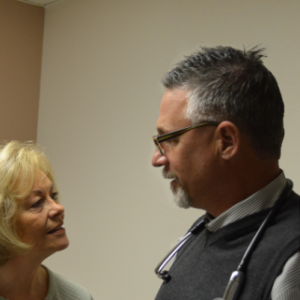
More than half of Iowa’s practicing physicians have a connection to the University of Iowa as a graduate of the UI Carver College of Medicine or a UI-affiliated residency or fellowship program.
Count Jim Poock among them. Not only did he earn his medical degree at Iowa, but he graduated from the Northeast Iowa Family Practice Residency Program—along with four MD classmates. All but one are now practicing in northeast Iowa.
“I’m an Iowa boy,” Poock says. “The office I work in here at the residency program is attached to what used to be Schoitz Hospital, where I was born.”
Born in Waterloo and raised in Decorah, where his dad was a high school teacher, Poock is now executive assistant program director of the Northeast Iowa Medical Education Foundation, which runs the residency program he completed. Besides seeing patients, he helps to develop the clinical skills of medical residents who may someday establish practices in Iowa. During their three-year training period, resident physicians provide comprehensive medical care to more than 7,700 active patients at the Northeast Iowa Family Practice Center in Waterloo.
“They come in as first-year residents almost scared of their own shadow, and three years later they walk out of here with their shoulders square, ready to take things on,” Poock says. “Watching that transition is really a fun process, especially knowing that you were part of that.”
Poock began his career in medicine as a paramedic. Before entering medical school, he was juggling a full-time job, responsibilities as a husband and father, and coursework to finish his undergraduate degree. The University of Iowa was the alma mater of most physicians he knew and close to his Waterloo home, so it was the first choice for his medical education.
“I was 33, so I thought I would be really out of place, but I didn’t feel that way at all. Medical school was fun for me once I adjusted to the volume of work that first semester,” he says. “They not only taught us physiology and anatomy, but they gave me good tools for approaching new information so I could continue to learn. Being a doctor is not a static experience; it’s a dynamic process where you’re always learning, things are always changing, and you have to be in a position to change with them.”
One of his most memorable experiences was the White Coat Ceremony, where entering medical students are donned with their first white coats. Poock’s class was the first at the UI to hold a White Coat Ceremony, which has been an annual rite of passage since 1995.
“The university did a good job of imparting to us the importance of being a good physician and the responsibilities we have to our patients and our communities.”
